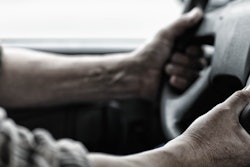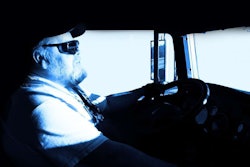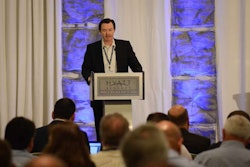How can fleets attract and retain good drivers? Communication and respect go hand in hand and are quite effective, said successful fleet executives during a panel at the annual meeting of the Truckload Carriers Association near Dallas.
At Pottle’s Transportation, drivers are guaranteed pay that’s the equivalent of 500 miles per day (with qualifications) if they drive less than that amount, said President Barry Pottle. He said factors beyond their control, such as breakdowns or detention, should not push their earnings too low.
 Prime Inc. offers drivers many recreational, health and business services at its headquarters facility.
Prime Inc. offers drivers many recreational, health and business services at its headquarters facility.“You need to respect your drivers as much as you do your office people,” Pottle said.
Prime Inc. managers took note of a survey indicating most drivers make a decision to leave a new fleet within their first 72 hours. Prime now ensures that new drivers are getting paid quickly to cover orientation and the first days of startup, said Darrel Hopkins, director of leasing. Before that policy was in place, “that first week they might not even get a check,” he said. “This guarantees they get off on the right foot.”
To foster communication and mutual respect, Canadian fleet Bison Transport has drivers sign an employment agreement that states, among other things, how long they will be on the road. That used to be 7 to 10 days, but now it’s five to seven days, said Garth Pitzel, safety director.
Bison has several divisions, each with different requirements regarding time on the road and other matters, so management makes a big effort to offer drivers a niche that suits their personal needs. The company also creates internet dashboards for each driver that show fuel economy and safety stats, but also allow a driver to request specific home times and know that a manager must respond.
Bison’s turnover, at 30 percent in recent years, fell to 18 percent last year, Pitzel said.
Prime makes it clear to drivers that they might be out four weeks at a time. Many of the drivers find it difficult to get home, and some don’t have a home, “so they have to make the terminal a home,” Hopkins said. Prime has built an industry-leading facility at its headquarters in Springfield, Mo., which includes a movie theater, cafes, a gym, a post office box, and services including haircutting, massage, accounting and more.
Pottle said his drivers have responded well to personalized birthday cards from him, as well as notes upon milestone year anniversaries, including bonuses that reflect $100 per year of service.
Hopkins said Prime has a “Breakfast with the Boss” every Friday morning, which includes top management as well as representatives from truck and trailer makers. “It’s like standing in front of a firing squad sometimes,” he said. “It’s powerful because they will say what’s on their mind. You’ve got to respect it, listen to it, figure out if you can do something about it.”
Prime has a joint telecast so that viewers at all terminals can see the proceedings via inset screens.
The company has also made great strides in two-way communication by having someone assigned to social media who’s developed large Facebook and Twitter followings.
Bison has had the most success with communication by having a 24-member driver advisory board and major driver involvement in a spec’ing committee and an accident prevention committee. “If they believe their voice is going to lead to change, they’re going to be active participants in your business,” Pitzel said.
The panelists agreed that management efforts to improve driver health have a great return on investment in terms of cutting costs and improving driver morale.
Pitzel said Bison discovered strong results in testing the premium Bose driver’s seats. Drivers reported significantly less fatigue at the end of each day. Drivers’ families were surveyed and reported that when a driver came home after days on the road, he typically had more energy, did not need to sleep right away, and in some cases was able to reduce use of pain medication.










